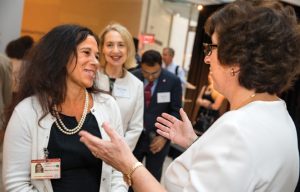
During a presidential inauguration celebration at the Medical College last fall, Pollack chats with Professor Susan Pannullo.Lindsay France/UP
“One Cornell.” That idea, so full of possibilities, was one of the things that drew me here, and over the past year I have seen it magnify the impact of research, teaching, and outreach University-wide. A particularly productive environment for synergies across our campuses is at the intersection of medicine, science, and technology.
Innovative research, an essential component of Cornell’s mission, also drives advances in education and public engagement. Weill Cornell Medicine’s Clinical and Translational Science Center (CTSC), for example, includes faculty and projects from the College of Veterinary Medicine, the Meinig School of Biomedical Engineering, and Cornell Cooperative Extension as well as several non-Cornell partners in New York City. Last fall it received a $45.3 million renewal grant from the National Institutes of Health to continue cross-disciplinary research, educational initiatives, and community health programs designed to bring research discoveries to patients more quickly. Over the next five years—as the CTSC focuses on creativity and entrepreneurship centered around the use of 3D printing in medicine—Cornell Tech, the Cornell Nanotechnology Center, and the College of Engineering will become increasingly important parts of the mix.
Gary Koretzky ’78, vice dean focused on academic integration at Cornell University and WCM, is working to create opportunities for faculty to collaborate in areas like genetics, computational biology, and data sciences that span departments, colleges, and campuses. His office provides seed support for research programs so they can subsequently compete effectively for external funding; it supports seminars and a series of multidisciplinary symposia to stimulate collaborations; and it is helping to create unique educational opportunities for our students.
Now that the Roosevelt Island campus has put WCM and Cornell Tech in close physical proximity, there is substantial cross-registration between students in WCM’s Department of Healthcare Policy and Research (HPR) and Cornell Tech, including a required course at WCM for Cornell Tech students in the Health Tech track. On the horizon is a new HPR PhD program in health data science, for which faculty from Cornell Tech will serve as faculty/mentors. Our Executive MBA/MS degree in healthcare leadership, geared to accomplished professionals, taps faculty at WCM, Cornell Tech, and the Ithaca campus for teaching and for the program’s capstone project. Its students earn both a Johnson MBA and an MS from the Weill Cornell Graduate School of Medical Sciences.
Public engagement, including clinical care, is the third component of Cornell’s mission. Rooted in our land grant tradition of serving the people of the state, the nation, and the world, it harnesses innovative research and teaching University-wide to provide important benefits directly to the public. One example is a new mobile app that helps patients monitor their recovery after major surgery and prompts them to call the hospital if their responses are abnormal. A surgical oncologist at WCM and a faculty member in health tech at Cornell Tech collaborated on the app, designed to improve patient outcomes.
Another tangible way that all three of our campuses—plus Cornell Cooperative Extension’s New York City office—collaborate is with Big Red STEM Day. Offered in partnership with the city’s Department of Education, it includes hands-on workshops aimed at encouraging students from under-resourced high schools to pursue education and careers in science, technology, engineering, and math. Cornell Tech also offers an ongoing K–12 program for students and teachers in New York City public schools and for school districts in the greater Ithaca area.
The flow of information, people, ideas, and opportunities among all our campuses is gathering strength with each passing day. Our students, our faculty, and the world will be the beneficiaries as we continue to harness the potential of combining our expertise in medicine, science, and technology. This is just one area in which we are harnessing the potential of “one Cornell.”
Martha E. Pollack
president@cornell.edu


